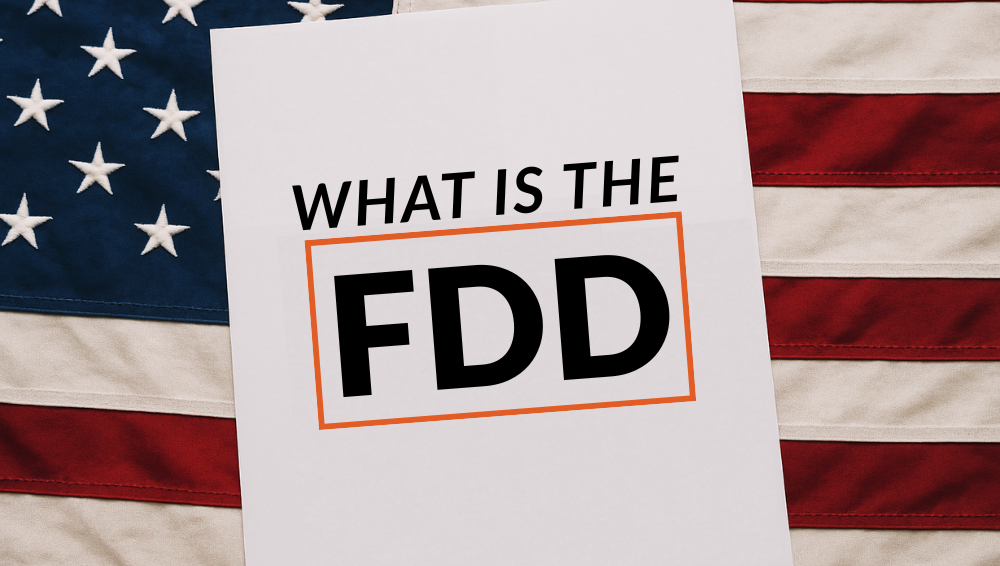What is the Franchise Disclosure Document (FDD)?
Thinking about buying a franchise in the United States? Understanding the FDD is the first and most important step. This guide breaks down the FDD in simple terms so you know exactly what it is.

By Success Team
Marketing Team

In the United States, the Franchise Disclosure Document (FDD) is a legal document that a franchisor must provide to a prospective franchisee before they can sign a franchise agreement or pay any fees. It is regulated by the Federal Trade Commission (FTC) under the Franchise Rule.
What is the purpose of the FDD?
The Franchise Disclosure Document (FDD) exists to protect people who are thinking about buying a franchise. Before someone hands over money or signs a contract, the FDD gives them a full picture of what they’re getting into.
In simple terms, the FDD helps a potential franchisee:
- Understand the business: Who the franchisor is, how long they’ve been around, and what their track record looks like.
- Know the costs: Including upfront fees, ongoing payments, and what it will take to get started.
- See the risks: Such as any lawsuits, bankruptcies, or problems in the company’s history.
- Learn what support they’ll receive: Like training, systems, marketing, and ongoing help.
- Review the rules: Including territory rights, obligations, and what happens if things go wrong.
In the United States, the FDD is required by law and must be given to a franchise buyer at least 14 days before signing anything or paying any fees. This gives people time to read, think, and get advice.
For a brand like Success Tutoring, the FDD would act as the official guide for anyone wanting to open a location in the U.S. It sets expectations clearly so both sides know their rights, responsibilities, and the investment involved. Without an FDD, a franchisor legally cannot sell a franchise in America.
You can access Success Tutoring's FDD template here.
In short: the purpose of the FDD is transparency. It’s there to help buyers make informed decisions and to ensure franchisors are upfront about how the business works.
When must the FDD be provided?
In the United States, a franchisor is legally required to give the Franchise Disclosure Document (FDD) to a potential franchise buyer at least 14 days before either of the following happens:
- Signing a franchise agreement
- Paying any money (such as a deposit, franchise fee, or initial payment)
This “14-day rule” exists to give people time to read, review, and get legal or financial advice before committing. It stops franchisors from rushing someone into a decision.
For example, if Success Tutoring is expanding into the U.S. and someone wants to open a location, Success Tutoring must provide them with the FDD no less than two weeks before they sign anything or pay any fees.
Some franchisors also give the FDD earlier in the sales process to build trust and show transparency—but by law, the minimum is 14 days.
In a few U.S. states (called “registration states”), there may also be additional requirements, like an FDD receipt that must be signed to prove the document was received on time.
Bottom line: A franchisor cannot legally sell a franchise in the U.S. unless the FDD has been delivered at least 14 days in advance of any agreement or payment.
What does the FDD contain?
The Franchise Disclosure Document is broken into 23 standard sections, all designed to give a potential franchisee a complete understanding of the business. You don’t need to memorise all 23, but here’s a simple breakdown of what it covers in plain English.
Think of it as a roadmap that explains:
1. Who the franchisor is
This part explains the company’s background, how long it’s been operating, and what industry it’s in. For a brand like Success Tutoring, this would include its origin story, growth, and business model.
2–4. Who runs the company and their history
These sections talk about the leadership team and include any past legal issues or bankruptcies. It's about showing stability and credibility.
5–7. Costs and investment
These parts outline all the required fees—like the initial franchise fee, startup costs, ongoing royalties, technology fees, and estimated total investment.
Example: If Success Tutoring enters the U.S. market, this is where someone would see the full cost of opening a center.
8–11. Rules, support, and restrictions
These sections cover things like:
- What you’re allowed to sell or offer
- What training and support you’ll receive
- What systems, trademarks, and branding you must follow
- Any territory rules (e.g., exclusive areas)
12–17. Legal rights and obligations
This explains what happens if:
- You want to renew or exit
- A dispute arises
- The franchise is transferred
- You’re required to operate directly or can hire managers
It also includes whether the franchisor shares financial performance data (Item 19), which many buyers look for.
18–20. Current and past locations
You’ll see how many franchises exist, how many have opened or closed, and what territories are growing.
21–23. Financials and contracts
These final sections include:
- The franchisor’s audited financial statements
- Copies of the contracts you’ll be expected to sign
- A receipt page you must acknowledge
The Franchise Disclosure Document is more than a formality it’s the backbone of ethical franchising in the United States. By outlining the costs, commitments, risks, and support involved, the FDD empowers prospective franchisees to make confident, informed decisions. For franchisors like Success Tutoring, understanding and complying with the FDD process is essential to building trust, protecting both parties and setting the foundation for long-term success.



